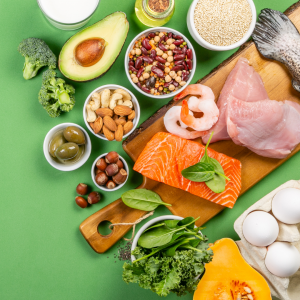What is the link between Mental Health and Nutrition?
It's been a tough year for us all and it is no surprise that there is a growing focus on mental wellbeing in companies, the media and with friends and family. It is widely reported that 1 in 4 people will experience mental ill health of some kind each year in England. In addition, the Office of National Statistics has also recently citing that cases of depression have doubled during the pandemic and this month we also recognised Mental Health Awareness week (10-16 May). Taking all of this into consideration, being aware of the signs of mental ill health and how to support those in need, has never been more important.
There are many influencing mental wellbeing such as isolation, discrimination, bereavement, long term stress to name a few. However, did you know that there are some lifestyle factors which can really help to support people in managing their wellbeing, including a good diet, exercise and sleep?
What is the link between nutrition and mental wellbeing?

Over recent years there has been a growing interest in the relationship between nutrition and mental health and research suggests a link between what we eat and how we feel. In a recent article by The BMJ, they observed that “by improving diet may help to protect not only the physical health but also the mental health of the population.” Following a healthy eating pattern such as a Mediterranean diet (which includes eating lots of fish, olive oil, pulses, nuts, fresh fruit and vegetables and limited red meat) may support blood sugar levels, the immune system and the healthy gut bacteria. All of these can support a decrease in anxiety and depression.
So which foods are not helping us?

When we are feeling low in mood or a bit fed up, it is a very natural reaction for many of us to reach for foods which provide us with comfort, such as chocolate, sugar, cakes, caffeine and maybe alcohol. But all of these foods and drinks put additional stresses and pressure on the body. They trick the body into releasing chemicals such as Serotonin, which we may temporarily be lacking and will all have a negative impact on the body, adding additional stresses.
Sugar increases blood glucose levels which will give a temporary high and add to anxiety, followed by a crash which may add to feelings of irritability and poor mood.
Alcohol, whilst it might feel relaxing initially, increases rates of aggression and depression and caffeine can make you feel wired but tired especially if you drink it too close to bedtime!
Dietary and Lifestyle things to help mental health
Firstly, aim to avoid processed pre-prepared foods, such as ready meals, nuggets and burgers. High saturated fat foods such as take aways, crisps and cakes won't help either. Aim to stick to a more Mediterranean style diet with lots of wholegrains, essential fats, fruits and veg might give your mood an initial boost. For tips on adding in more fruits and veg please check out this blog
There are also other more lifestyle changes that might also contribute to helping us to feel better including:
- Relaxing and de-stressing. Taking time out for ourselves, even for just 15 minutes a day, and doing something which relaxes us can make a difference for example: a soak in a nice hot bath, going for a walk in nature, meditation, guided breathing or yoga to calm the mind.
- Taking regular exercise, just doing something and moving your body, to whatever level feels comfortable, might help to lift your mood. A mix of relaxing style exercise such as pilates and yoga with some higher intensity cardiovascular and weight bearing exercises is ideal for most.
- Eating with others. This will give us a chance to connect with others and reflect on the day, perhaps sharing some of the challenges we are facing.

If you are wanting to explore how to get more relaxation into your busy working week, please do join my five-day self-care challenge, starting on Monday 24 May or click here to get in touch to book a no obligation call to chat through your health and health aspirations.
Sources:
https://www.mentalhealth.org.uk/a-to-z/d/diet-and-mental-health
